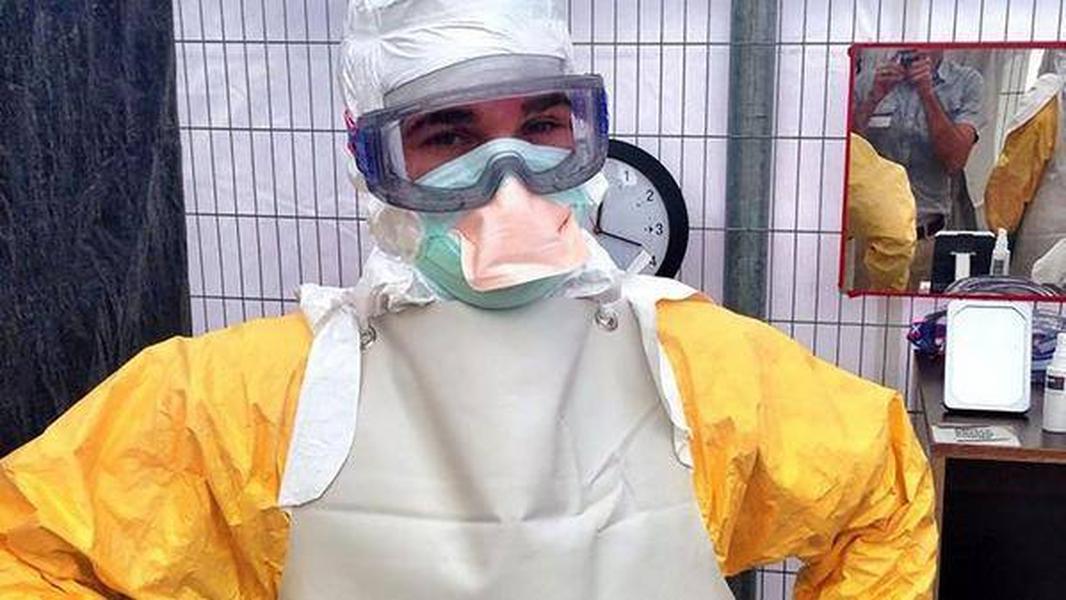New York quarantines 3 people in contact with Ebola-carrying doctor


A free daily email with the biggest news stories of the day – and the best features from TheWeek.com
You are now subscribed
Your newsletter sign-up was successful
After Dr. Craig Spencer tested positive for Ebola on Thursday, New York City quarantined his fiancée and two friends, city health commissioner Mary Bassett said, adding that none of the three is exhibiting any symptoms. Spencer, a member of Doctors Without Borders, returned from treating Ebola patients in Guinea a week ago. He is now in an isolation unit at New York City's Bellevue Hospital, where he was taken by hazmat-suited EMTs in a police-escorted ambulance.
The Centers for Disease Control and Prevention has dispatched a team to New York, and public health officials say that Spencer acted responsibly — he kept his contact with the public minimal and took his temperature twice a day. The chance that he spread Ebola on his subway rides is "close to nil," Bassett said, and the Brooklyn bowling alley he visited Wednesday evening has been closed as a precaution — though The New York Times assures us that "it is extremely unlikely that Ebola could be passed" via "the surface of a shared bowling ball."
If someone left blood, vomit, or feces on a bowling ball, and the next person to touch it did not even notice, and then put his fingers into his eyes, nose, or mouth, it might be possible. But, the Ebola virus does not not normally build up to high levels in saliva or mucus until very late in the disease — several days after the initial fever sets in — and it is unlikely that someone that ill would have just gone bowling. Also, the Ebola virus is fragile and susceptible to drying out. It does not normally survive for more than a few hours on a hard, dry surface. [New York Times]
Now you know.
The Week
Escape your echo chamber. Get the facts behind the news, plus analysis from multiple perspectives.

Sign up for The Week's Free Newsletters
From our morning news briefing to a weekly Good News Newsletter, get the best of The Week delivered directly to your inbox.
From our morning news briefing to a weekly Good News Newsletter, get the best of The Week delivered directly to your inbox.
A free daily email with the biggest news stories of the day – and the best features from TheWeek.com
Peter has worked as a news and culture writer and editor at The Week since the site's launch in 2008. He covers politics, world affairs, religion and cultural currents. His journalism career began as a copy editor at a financial newswire and has included editorial positions at The New York Times Magazine, Facts on File, and Oregon State University.
-
 6 exquisite homes with vast acreage
6 exquisite homes with vast acreageFeature Featuring an off-the-grid contemporary home in New Mexico and lakefront farmhouse in Massachusetts
-
 Film reviews: ‘Wuthering Heights,’ ‘Good Luck, Have Fun, Don’t Die,’ and ‘Sirat’
Film reviews: ‘Wuthering Heights,’ ‘Good Luck, Have Fun, Don’t Die,’ and ‘Sirat’Feature An inconvenient love torments a would-be couple, a gonzo time traveler seeks to save humanity from AI, and a father’s desperate search goes deeply sideways
-
 Political cartoons for February 16
Political cartoons for February 16Cartoons Monday’s political cartoons include President's Day, a valentine from the Epstein files, and more
-
 Trump HHS slashes advised child vaccinations
Trump HHS slashes advised child vaccinationsSpeed Read In a widely condemned move, the CDC will now recommend that children get vaccinated against 11 communicable diseases, not 17
-
 FDA OKs generic abortion pill, riling the right
FDA OKs generic abortion pill, riling the rightSpeed Read The drug in question is a generic version of mifepristone, used to carry out two-thirds of US abortions
-
 RFK Jr. vaccine panel advises restricting MMRV shot
RFK Jr. vaccine panel advises restricting MMRV shotSpeed Read The committee voted to restrict access to a childhood vaccine against chickenpox
-
 Texas declares end to measles outbreak
Texas declares end to measles outbreakSpeed Read The vaccine-preventable disease is still spreading in neighboring states, Mexico and Canada
-
 RFK Jr. shuts down mRNA vaccine funding at agency
RFK Jr. shuts down mRNA vaccine funding at agencySpeed Read The decision canceled or modified 22 projects, primarily for work on vaccines and therapeutics for respiratory viruses
-
 Measles cases surge to 33-year high
Measles cases surge to 33-year highSpeed Read The infection was declared eliminated from the US in 2000 but has seen a resurgence amid vaccine hesitancy
-
 Kennedy's vaccine panel signals skepticism, change
Kennedy's vaccine panel signals skepticism, changeSpeed Read RFK Jr.'s new vaccine advisory board intends to make changes to the decades-old US immunization system
-
 Kennedy ousts entire CDC vaccine advisory panel
Kennedy ousts entire CDC vaccine advisory panelspeed read Health Secretary RFK Jr. is a longtime anti-vaccine activist who has criticized the panel of experts
